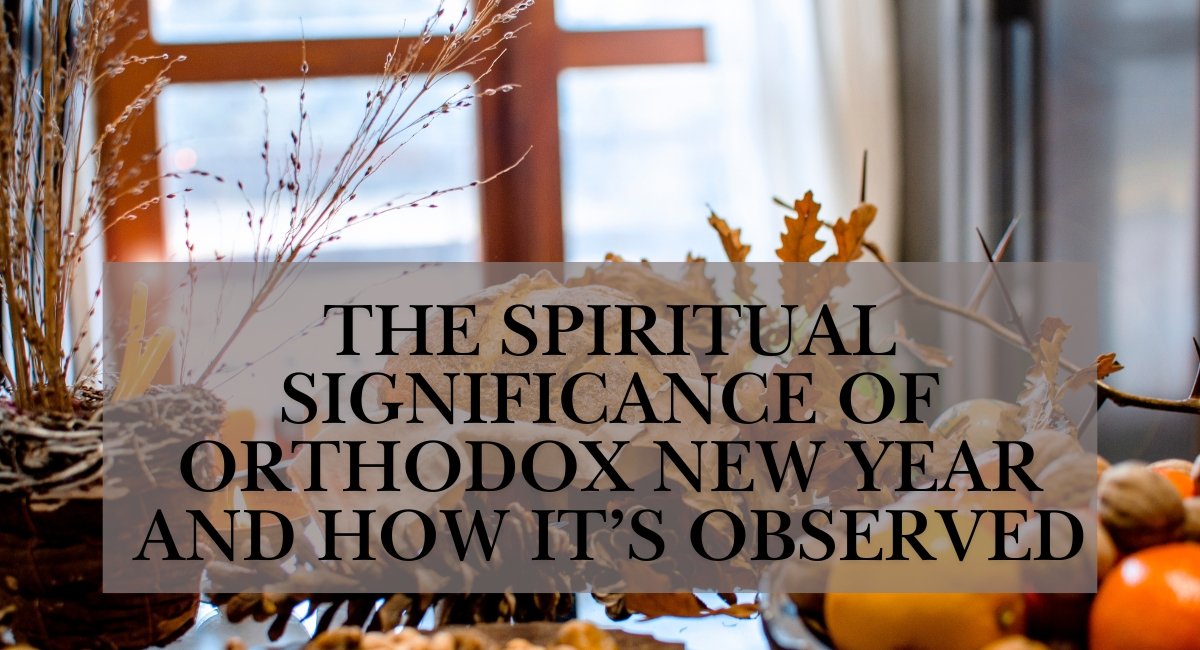The Spiritual Significance Of Orthodox New Year And How It’s Observed
This post contains paid and/or affiliate links. I make a small commission at no extra cost to you. Please see our Privacy Policy.
The Orthodox New Year, also known as the Old New Year, is celebrated on January 14 in the Gregorian calendar. It aligns with January 1 on the Julian calendar, which the Orthodox Church uses for religious purposes. This day is filled with tradition and religious beliefs, focusing on renewal, hope, and gratitude.
For many, the Orthodox New Year is a time for spiritual reflection. It’s a chance to look back at the past year and think about personal growth. People and families come together, strengthening their bond with God and each other.
Key Spiritual Themes
Several spiritual themes are important during the Orthodox New Year:
- Renewal: It’s seen as a fresh start, encouraging people to grow and improve.
- Gratitude: People thank God for the blessings of the past year, big and small.
- Community: Family and community gatherings highlight the importance of social bonds.
- Forgiveness: Many seek forgiveness and forgive others, promoting spiritual healing.

Traditions and Rituals
The Orthodox New Year has unique traditions and rituals. These customs vary but share the same spiritual meaning.
1. Special Church Services
Orthodox Christians often attend a church service on New Year’s Eve. The service focuses on hope, blessings, and remembering loved ones who have passed away. It helps believers focus on their faith and spiritual life.
2. Family Gatherings and Feasts
Family is key in the celebration. Sharing meals, often with special dishes, strengthens family bonds. Traditional foods include:
- Vasilopita: A sweet bread with a hidden coin, symbolizing good fortune.
- Fish and vegetables: Associated with abundance.
- Fruits: Representing the sweetness of life and a bountiful harvest.
3. Lighting Candles
Lighting candles in homes symbolizes the illumination of the spirit. It’s a wish for divine guidance and is often followed by prayers for health, happiness, and prosperity.
4. Visiting the Elderly
Visiting elderly family members or neighbors is encouraged. It shows respect and acknowledges the wisdom of age. It brings joy to all involved, promoting community spirit.
Spiritual Reflections
The Orthodox New Year is more than just celebrations. It’s a time for deep spiritual reflection. People take time to think about their actions, prayers, and lessons learned. This reflection can lead to a stronger faith and community commitment.
Religious Observances and Community Activities
In many Orthodox communities, the New Year is filled with religious observances and community activities. These highlight its importance:
- Volunteering: Charitable acts and outreach to the less fortunate show the spirit of giving.
- Prayer Rallies: Communities gather for collective prayers for blessings in the coming year.
- Spiritual Talks: Churches host discussions on faith during tough times, uplifting many.
The Orthodox New Year is a celebration that combines spirituality, community, and personal growth. It’s celebrated through church services, family gatherings, and charitable acts. The essence of the day is reflection, appreciation, and new aspirations.
In essence, the Orthodox New Year is not just a festive occasion. It’s a meaningful journey inward that inspires people to embrace new possibilities and deepen their faith and community connections.
Reflections on Personal Growth: Embracing New Beginnings in the Orthodox Calendar
Personal growth is a lifelong journey. The Orthodox Calendar offers deep chances for reflection and renewal. It guides you through life’s complexities with spiritual teachings. Key dates and seasons invite you to look inward, assess your growth, and plan for the future.
Orthodox Christians celebrate feasts and fasts throughout the year. These events are more than rituals. They are turning points for self-reflection. Let’s explore how the Orthodox Calendar relates to personal growth and new beginnings.
Major Orthodox Holidays and Personal Growth
Several holidays are key for self-reflection and growth. Each festival teaches unique lessons and offers spiritual enrichment:
- Christmas (Nativity): This season marks Christ’s birth, bringing hope and new beginnings. It encourages you to reflect on your life and welcome renewal.
- Pascha (Easter): Celebrating Jesus’ resurrection, Pascha teaches transformation and rebirth. It reminds us that growth often follows struggle.
- Theophany (Epiphany): This feast shows Christ’s divinity through baptism, inspiring introspection. It prompts people to live their faith in daily actions.
- Pentecost: This feast marks the Holy Spirit’s arrival, symbolizing inspiration and guidance. It encourages believers to seek Divine support in their growth.
Seasons of Reflection in the Orthodox Calendar
The Orthodox Calendar has periods for reflection and self-improvement. These seasons are great for personal growth:
| Season | Focus | Activities |
|---|---|---|
| Great Lent | Introspection and repentance | Fasting, prayer, and almsgiving |
| Holy Week | Reflection on Christ’s passion | Attending services, reading scriptures |
| After Pentecost | Applying the lessons learned | Community service, personal evaluation |
Exploring these seasons can deepen your understanding of personal and spiritual goals.
By fully engaging in these periods, you can focus on renewal and reflection. This is key to meaningful personal growth.
Practical Steps for Embracing New Beginnings
To fully embrace growth through the Orthodox calendar, consider these practices:
- Journaling: Writing down your thoughts helps you reflect and set new intentions.
- Community Participation: Being part of your church community offers support and accountability.
- Setting Intentions: At each season’s start, set personal goals that align with spiritual teachings.
- Meditation and Prayer: Daily practices can deepen your faith and purpose.
These practices help you live the virtues of the Orthodox faith daily. Remember, growth is about the journey, not just the end. It’s about the experiences and lessons learned along the way.
As you journey through the Orthodox Calendar, celebrate your milestones and growth. Embracing new beginnings with an open heart leads to a rewarding path.
Each celebration, fast, and reflection is a chance to grow, renew, and deepen your faith and self-understanding.
Conclusion
As the Orthodox New Year arrives, it’s a time for spiritual renewal and reflection. Traditions and rituals play a big role, helping us connect with our faith, family, and community.
Church services and festive meals strengthen our bonds and encourage us to look within.
This special time is not just about marking the start of a new year. It’s a chance to reflect on our personal growth.
It invites us to start anew, seeing each year as a fresh start to chase our dreams and goals. It’s a time to leave challenges behind and welcome new opportunities with open arms.
By learning from our experiences, we can enter the new year with a renewed spirit. Embracing the Orthodox New Year means striving to improve in our relationships, spirituality, and achievements.
It’s a time to spread hope, gratitude, and love, building community and belonging.
As you celebrate, think about what the new year means to you. Let the traditions of this time inspire and uplift you. Remember, every day is a chance to grow and fulfill your dreams.
The Orthodox New Year reminds us that with each sunrise, we can start anew and thrive on our journey.



